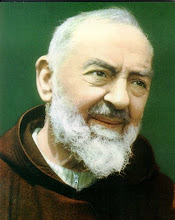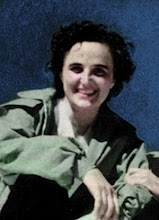Today, April 28th, is the feast day of my patron saint, Gianna Beretta Molla.
I chose her as my Confirmation saint because, at the time of my Confirmation, I was very heavily and actively involved in Pro-Life work (I still am involved, though my ministry has taken the form of prayer more than anything else, lately). And who is a better example for a Pro-Lifer than Gianna Molla?
I am sure most of you already know the main focus of her story; how she was a doctor, wife, and mother who was diagnosed whith a uterine tumor when she was pregnant with her fourth child. How she refused proper treatment because she refused to harm her baby. How she died when that baby was only one week old...
Therefore, I am going to speak of something less often mentioned about Gianna: her interaction, as a doctor, with patients who had had or who intended to have, an abortion.
Gianna's stance on abortion was very firm. She viewed all human life as ineffably precious, and illustrated her views where words could not express them by being unfailingly charitable, caring and loving to everyone, and by never failing to do what it took to save her patients. Her sacrifice is a testament to her reverence of life. Gianna was well aware of the fact that abortion involves the ending of a new yet equally important human life, and so her views on the subject are rather obvious. She was greatly grieved when one of her patients considered abortion, and would talk to them about their decision, discussing with them the value of life and encouraging them to rethink their options. Nevertheless, no woman ever met any sort of condemnation or intolerance from her. She was motherly toward them, and treated them with the utmost compassion no matter her strict stance.
"Once, a young woman asked Gianna to come to her home because of some "mysterious" hemorrhaging, which was actually the result of an attempted abortion. Gianna treated her compassionately, but firmly, urging her to seriously consider what she had done. ...On another occasion, Gianna treated a young woman who had had an abortion. With particular kindness, Gianna offered the young woman some words on the sacredness of human life, which the patient listened to attentively. Gianan gently encouraged the woman to face the seriousness of her act and to realize that what she had done was not only an act of offense against her child, but also against God. Gianna invited her patient to be reconciled with the Lord, and she encouraged her to embrace God's infinite mercy." [A Woman's Life, by Guiliana Pelucchi, p. 59-60]
I hear often from Pro-"Choicers" that those who are against abortion are also against women. That they just wish to make women's lives more difficult, that they only hurt women by making them feel guilty. That they don't care for women, even hate and kill them, etc. etc. Gianna is proof that that is not what being Pro-Life is about. Being Pro-Life is being Pro-LIFE. She talked of God's mercy as much as she did the wrongness of abortion and the value of human life. She supported women during and after their pregnancy, caring for them and their children often without accepting payment. Gianna cared no less for the lives of the mothers in her care than for the lives of their children; of that her actions left no room for doubt. Everyone who knew her liked her, and cries for her Cause arose soon after her untimely death. Her example is a brilliant one, one which I strive always to follow. Gianna was Pro-Life. For that cause she gave her entire life and even her death. Even those who had had an abortion acknowledged and appreciated her. What better saint could I have chosen for this day and age?
Saint Gianna, pray for us!















